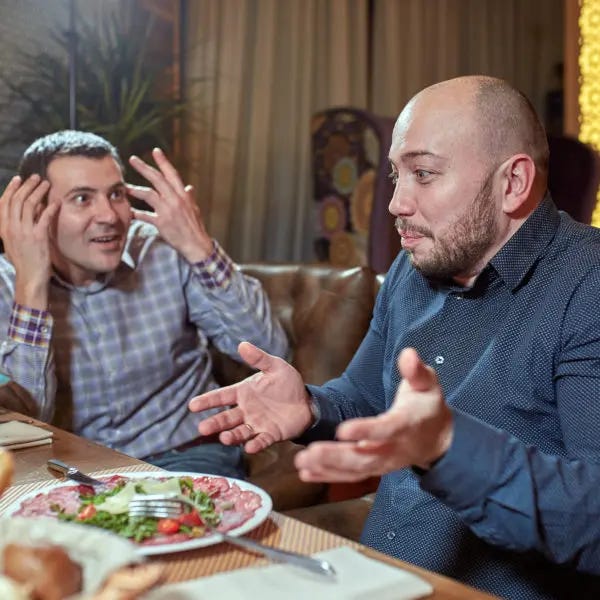How To Talk Politics at Thanksgiving Without Causing a Family Feud
The key is humility and a genuine willingness to learn
As you pack your bags for your Thanksgiving trip, you may be starting to worry about that “crazy” uncle, extreme aunt or other sour relative whose political views are so different from your own that anxiety turns expectations of what should be a happy family gathering into the grim anticipation of impending doom.
Many people resort to telling their children, siblings and spouses not to discuss certain topics at the family gathering for fear of setting off those relatives—or just giving them an excuse to rant about whatever their cockamamie view is that day. Total avoidance is the only way they can see to keep the peace and prevent the polarization that exists across the country from leading to acrimony at their own feast.
The suggestion that we should not discuss the controversial topic du jour is now often defended with claims about how it is uncivil or disrespectful to disagree with anyone or to bring up controversial issues that are sure to encourage disagreement. Despite the popularity of this view, it is a mistake.
Not only is the avoidance policy a fool’s game, destined to fail regardless, but it is also misguided from the outset. There will always be disagreements. If we don’t disagree about defunding the police, Black Lives Matter, this president’s immorality, that president’s idiocy, the government handling of COVID-19, we’ll find something else to disagree about. Trying to suppress disagreement simply causes festering animosity.
The reason the animosity festers is that if you refuse to allow yourself to disagree with someone, you’re essentially accepting that they are not capable or worthy of honest discourse. You might think Uncle Dan can’t be reasoned with; he’s an imbecile, so why even try? Thinking in those terms leads not to acceptance or love of the other, but to disgust, and that disgust is often hard to shake. So disagreement will emerge one way or another, and trying to prevent it is likely to make the disagreement that finally erupts more acrimonious and less civil.
Importantly, though, honest disagreement is not uncivil or disrespectful in the first place. Indeed, it’s a sign of respect. If my 3-year-old told me that I was wrong to think a particular politician is terrible because that politician is actually quite wonderful, I would not argue with him. Why? Because as a 3-year-old, he is simply not in a position to have a reasonably well-thought-out view of the matter. All 3-year-olds deserve respect, but not for their political views.
Uncle Dan, I assume, is not a toddler, but if I refuse to argue with him about a politician, I am treating him as I would my 3-year-old. This is the opposite of respect! To show respect for Dan, I must be willing to engage with him. I must recognize that he, like me, is a person with his own views and his own reasons for those views, and that he is also capable of changing his mind, like any rational being. Yes, disagreement is a sign of respect.
This Thanksgiving, I encourage you to treat those family members with whom you disagree with respect. Engage them, not with vitriol, but with curiosity and an eagerness to learn—if not to learn how you’re mistaken, at least to learn why others think differently from you. Assume they have reasons because they probably do. If they don’t, perhaps you can uncover the etiology of their belief instead. In discussion, maybe they can also come to understand why you think the way you do. Indeed, you might both learn something about yourselves and each other.
I can’t say this is an easy task. It can be difficult—in part because of the anxiety we often manufacture around such discussions and in part because it requires allowing ourselves to be intellectually and emotionally vulnerable. You cannot go into a discussion like this holding steadfast to your own beliefs about the topic at hand. If you think they are wrong, remember that they are also thinking you are wrong. In fact, maybe you’re both wrong. You won’t know unless you are willing to take them seriously, treating them as a reasonable person who can be corrected—and recognizing that you also may need correction.
When you approach a discussion this way—recognizing that you and Uncle Dan are both due the respect of disagreement and are both capable of being wrong as well as capable of being corrected—you can learn more about the world, as well as more about each other. Admittedly, you may not change each other’s minds; perhaps after extensive discussion you each understand where the other is coming from but still think the other is clearly wrong. Yet even if neither of you changes your beliefs about the topic, you will have learned more about each other!
Increased mutual understanding through discourse is extremely helpful—and exactly what we need in these polarized times. The same model of respectful disagreement that works among individuals can work for society as a whole. It can lead to more compassion for each other and a happier Thanksgiving feast with love and fellow-feeling—something to be truly thankful for.




